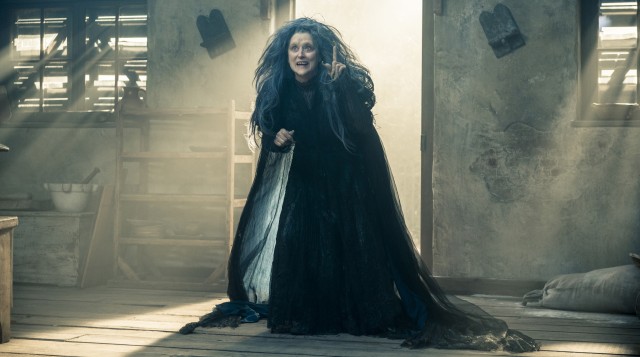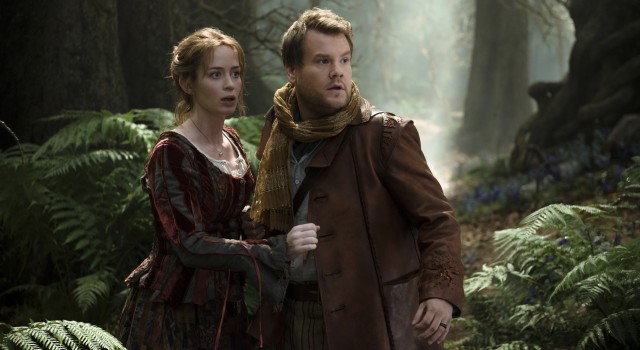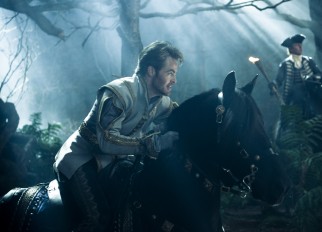Into the Woods Movie Review
 |
Into the Woods
Theatrical Release: December 25, 2014 / Running Time: 124 Minutes / Rating: PG Director: Rob Marshall / Writers: James Lapine (screenplay & musical), Stephen Sondheim (musical) Cast: Meryl Streep (Witch), Emily Blunt (Baker's Wife), James Corden (Baker), Anna Kendrick (Cinderella), Chris Pine (Cinderella's Prince), Christine Baranski (Cinderella's Stepmother), Tracey Ullman (Jack's Mother), Johnny Depp (Wolf), Lilla Crawford (Little Red Riding Hood), Daniel Huttlestone (Jack), Billy Magnussen (Rapunzel's Prince), MacKenzie Mauzy (Rapunzel), Tammy Blanchard (Florinda), Lucy Punch (Lucinda), Frances de la Tour (Giant), Simon Russell Beale (Baker's Father) |
For some reason, Christmastime brings Broadway musicals to the silver screen. There was Chicago in 2002, Phantom of the Opera in 2004, The Producers in 2005, Dreamgirls in 2006, Sweeney Todd in 2007, Nine in 2009, and Les Misιrables in 2012. Woods hails from the beloved 1980s musical by Stephen Sondheim and James Lapine, a show familiar to and popular with anyone versed in drama clubs and community theatre as performer or spectator. It finally makes its way to film from Chicago and Nine director Rob Marshall, produced and distributed by Disney with Lapine writing the screenplay and a cast full of A-list Hollywood talent.
Like the stage show, the film is set in a world in which fairy tale characters co-exist. The stories of Little Red Riding Hood, Cinderella, Jack and the Beanstalk, and Rapunzel run into one another, forming a tangled narrative. At the center of it is a couple -- the Baker (James Corden) and his wife (Emily Blunt) -- who have been unable to conceive a child. A visit from their neighbor, the Witch (Meryl Streep), explains why that is and how the only way her curse on their fertility will be lifted is to acquire four items she needs but cannot personally touch: the cow as white as milk, the cape as red as blood, the hair as yellow as corn, and the slipper as pure as gold. The couple has just three nightfalls to bring these items to the Witch and let her work her magic.
The bakers' efforts lead us to these different familiar storylines. Red Riding Hood (Lilla Crawford) goes into the woods to visit her grandmother and instead runs into a big bad wolf (Johnny Depp). Cinderella (Anna Kendrick) gets her chores done and some help from her late mother to attend multiple royal balls. And young Jack (Daniel Huttlestone) goes off to sell his best friend, a cow that has stopped producing milk, so that he and his mother (Tracey Ullman) might eat again. Though instructed to sell the animal for no fewer than five golden pounds, Jack gives the cow to the baker and wife in exchange for five "magic" beans.
Checking off the four items on the Witch's supply list isn't as easy as that, though. The bakers' count of the required objects rises and falls. Our attention from that is redirected elsewhere, to two princes (Chris Pine and Billy Magnussen) who are smitten by two different princesses and a giant woman (Frances de la Tour) who climbs down one of the beanstalks sprouting from the beans to exact revenge on the boy who caused her husband's death.
Into the Woods makes the leap from stage to screen without much difficulty or imagination. The 2½-hour play has been condensed to a more suitable runtime of 124 minutes with long credits scroll. The character of the narrator is lost and so too is perhaps the play's biggest laugh. The narration becomes a more traditional voiceover, provided by the Baker, and the fourth wall remains unbroken. Also lost is the artifice of theatre. On stage, the giant was unseen, just a loud, deep voice. Despite Depp's love of bold characterization and Disney's love of Depp, the Wolf's role is surprisingly just as small here as it is on stage. That likely eliminates Depp from Golden Globe contention, no matter how much the Globes love celebrities and Depp especially (they've nominated him ten times before, most recently and questionably for 2010's duo of Alice in Wonderland and The Tourist). Even without Depp, the Globes are the award show where Into the Woods will have its greatest chance to shine. As a musical comedy, its Musical or Comedy designation is the rare one that can prompt no disputes. That significantly lightens the competition, with Birdman being the biggest threat for Best Picture.
Last year seemed certain to produce the first live-action Disney-branded Best Picture Oscar nominee since Mary Poppins half a century ago. Then, Saving Mr. Banks surprisingly missed the cut and wound up with only an Original Score nomination. This year, Disney should know better than to expect to crack the Best Picture field of what for the last three years has been nine nominees. At the same time, the film is virtually guaranteed to compete in technical categories, like Make-Up and Hairstyling, Costume Design, Sound Mixing, and possibly even Production Design. It also seems quite likely that Streep adds to her already all-time record eighteen Oscar nominations. She should show up in the Best Supporting Actress category, where she won her first of three statuettes to date.
Nominating Streep may be a knee-jerk reaction for the Academy, but if anyone in this large ensemble cast deserves recognition from the industry's highest honors, it is her. It is a big character requiring a big performance, which Streep is more than willing to give it. She may not come from musical theatre (though she did spend two months in 1977 starring in a Broadway musical) and some questioned her singing abilities in Mamma Mia! But Streep is the real deal, as big a female movie star as any in Hollywood but still a serious and highly talented actor. She could approach this job as one for the grandchildren which she does not yet have, a hefty paycheck to do some of the broad costumed acting that Depp has embraced as the world's richest children's entertainer. That's not Streep's style. She commits fully to this witch, singing and dancing like she has been doing it her whole life and likely winning over the most devoted Bernadette Peters fans in the process.
Streep isn't the only member of this ensemble who impresses. Blunt and Corden, who are being campaigned as leads, are compelling and sympathetic as the film's most human characters. It doesn't seem to matter that Corden is a veteran of London and New York's stage while Blunt has increasingly become a leading lady of sci-fi action films. Each sells the material convincingly and makes you overlook that casting them as a couple is like the starting point of a CBS sitcom. Kendrick has already proven her ability to carry a tune in Pitch Perfect and its Billboard-charting "Cups." She stifles any impulse to upstage, but relishes the few minor opportunities to acknowledge the ridiculous nature of the composite fairy tale narrative, which is for the most part treated seriously and without the nod-wink irony of the stage show.
Just when he seemed destined to be classified as more serviceable actor than star, Chris Pine becomes one of the cast's most surprising bright spots. His performance drew by far the biggest reaction of my screening, It's tough to say how the film will play with audiences, particularly those who come in not knowing the stage show on which it's based and perhaps expecting something more like a big screen, big budget version of ABC's "Once Upon a Time." Certainly, Disney has done better than anyone else in the business when it comes to fairy tales. That their most Broadway-ready animated musical to date, Frozen, just recently closed its long run with a worldwide gross of $1.3 billion bodes well for this film. It seems considerably more realistic, however, to assume Disney is expecting a performance more in line with Les Mis' $159 M domestic, $442 M worldwide haul from two years ago. Such a showing would be highly profitable in light of the movie's reasonable reported $50 M production budget and enough to justify this film's existence as an anomaly in the current brand-driven, franchise-minded Disney business model.
|
Related Reviews:
DVDizzy.com | DVD and Blu-ray Reviews | New and Upcoming DVD & Blu-ray Schedule | Upcoming Cover Art | Search This Site
Into the Woods (Original Broadway Production Blu-ray)
Now in Theaters: Big Eyes The Theory of Everything Big Hero 6 The Hunger Games: Mockingjay, Part 1
Music by Stephen Sondheim: Sweeney Todd: The Demon Barber of Fleet Street Gypsy Dick Tracy
Directed by Rob Marshall: Chicago Nine Pirates of the Caribbean: On Stranger Tides
Meryl Streep: The Giver August: Osage County Doubt Marvin's Room | James Corden: Begin Again
Emily Blunt: Edge of Tomorrow The Muppets Gulliver's Travels | Tracey Ullman: Once Upon a Mattress
Tangled Ella Enchanted Frozen Once Upon a Time: The Complete First Season
Dreamgirls Newsies Mary Poppins The Sound of Music Oliver! Funny Girl
Jack the Giant Slayer The Brothers Grimm Cinderella Red Riding Hood



